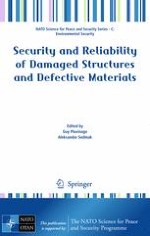2009 | OriginalPaper | Chapter
Fatigue Failure Risk Assessment in Load Carrying Components
Author : Ing. Dragos D. Cioclov
Published in: Security and Reliability of Damaged Structures and Defective Materials
Publisher: Springer Netherlands
Activate our intelligent search to find suitable subject content or patents.
Select sections of text to find matching patents with Artificial Intelligence. powered by
Select sections of text to find additional relevant content using AI-assisted search. powered by
A methodology is presented for integrating probabilistic fracture mechanics (PFM) with quantitative non-destructive inspection (NDI) for the purpose of failure risk assessment in load-carrying elements, mainly, under cycling loading. The definition of the failure risk in structural components is made in the context of the general approach of structural reliability with highlights on the sources of uncertainties and variability encountered in the analysis. The quality of NDI is accounted by the probability of detection (POD), as function of the flaw size. The main focus in the presentation is placed on the fatigue failure risk assessment in conjunction with the quality and timing of the envisaged NDI. The management of failure risk in aerospace technology is exemplified in the framework of established philosophies known as fail-safe and damage tolerance approach. Fail-safe or total life (TL) approach is outlined by the probabilistic assessment of the fatigue life of landing gears components under realistic loading spectra encountered by a combat aircraft. A parametric analysis of the interplay between the iso-probable fatigue life and deterministic safety factors, as applied to the mean life, is outlined. Damage-tolerance (DT) approach to structural safety, having at the core fracture mechanics technology, is presented in the framework of probabilistic paradigm with its inter-relation with variability and uncertainty associated with non-destructive inspection practice. On the base of Monte Carlo computer simulation, a rationale have been developed encompassing the fatigue crack growth (FCG) both under short- and long-crack regime, thus addressing the entire fatigue life. For this purpose, the concepts of “initial fictitious crack” size and “equivalent initial flaw” size are discussed for the purpose of the implementation in the FCG analysis. By computer simulation, it is exemplified the FCG in an aluminum alloy of class 2024 T, for a coupon with central hole. The scatter of the total fatigue life and the crack size at a given life in the simulation follows from the probabilistic input of material strength characteristics (ultimate tensile strength, yield point and fracture toughness) as well as from probabilistic FCG parameters entering a Paris—Klensil type relationship. Further, by fitting the simulated data into continuous statistical distributions enabled to model the key distributions involved in the fatigue failure risk assessment. Finally, the probability of failure, at a specific timing during the fatigue life, is estimated by Monte Carlo massive simulation of the final failure on the base of Failure Analysis Diagram (FAD) approach. It is demonstrated the benefit of applying a non-destructive inspection technique qualified by a specific probability of detection (POD) dependence on the crack size. Quantitatively, the decrease of failure risk is evinced in terms of failure probability. Computer re-sampling simulation known as “bootstrap” technique has been applied for constructing confidence intervals on POD vs. crack size in order to use in the risk analysis safe bounds of POD vs. crack size which, otherwise, are established, merely, on expert bases. It is also discussed the integration of quantitative NDI with probabilistic fracture mechanics, from the perspective of assessing a better timing and capability ranking of non-destructive inspection procedures.
